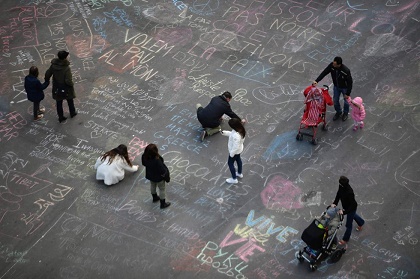A broken heart of Europe
Resignation is the most spread feeling amongst Brussels inhabitants. Even the Belgian Prime Minister, Charles Michel, said in the first press conference: “What we feared has happened. Our country has been struck by vile attacks”.
BRUSSELS · 22 MARCH 2016 · 15:39 CET
It was meant to happen. After the first threat during the Brussels Lockdown in November, even with reinforced security, most of the people expected a terrorist attack sooner or later. Resignation is the most spread feeling amongst Brussels inhabitants.
Read the testimony of a Spanish evangelical churchgoer who was at the airport during the attack.
Even the Belgian Prime Minister, Charles Michel, in the first press conference after the blasts, stated: “What we feared has happened. Our country has been struck by vile attacks”.
The public prosecutor has confirmed that the two attacks in Brussels National airport that have killed 14 passengers were perpetrated by a suicide bomber.
There is still a lot of uncertainty around the explosion in the metro station of Maalbeek, in the middle of the European neighbourhood, where 15 people lost their lives. There are more than 190 wounded.
“Brussels is no more than a siren” was one of the headlines on the website of Le Soir. Apart from the ambulances, police raids have started again; they have neutralised a car in the commune of Ixelles, and discovered a suspect package near the Free University of Brussels (VUB). There is also been a bomb alert near Hospital Saint Pierre.
On social media, internet users wonder if the attacks are a revenge for Salah Abdeslam’s detention, four days ago. Mr. Abdeslam was the main suspect of the Paris Attacks of last November.
The Prime Minister asked the population to stay calm: “We must face this ordeal in unity, solidarity, and together”.

Brussels inhabitants are writing encouraging messages with chalk on the pedestrian streets in the city centre. Others are tweeting with the hashtag #porteouverte (open door) for passengers who had to leave Brussels and have nowhere to stay.
TARGETING THE EUROPEAN INSTITUTIONS
The two targets were not chosen randomly. This week European Institutions close Thursday and Friday for Easter holiday. A lot of European workers have taken the week off to go back to their countries, most of them by plane. The Belgian National Airport’s slogan is “the heart of Europe”.
On the other hand, another “heart” has been targeted. Maalbeek is not the busiest metro station, but actually, it is crowded during rush hour; it is the closest metro station to the European Parliament, European Council and some other European Commission buildings. Many of the European workers and workers from other institutions and organisations related to European Union get down from the metro at that stop in the morning.
ANOTHER LOCKDOWN?
The Belgian government asked the parents not to get their children out of schools and to remain calm. The Free University of Brussels, however, has been evacuated and the other universities have closed their buildings. The football games have been cancelled. Public transports and the airport remain shut, as the Belgian government raises the alert level to 4.
The Belgian minister of telecommunications, Mr. Alexander De Croo asked people to communicate by SMS and social media so the phone lines would not be saturated. A Belgian emergency number was established to inform the citizens (1771) but the line was blocked for almost an hour between 10 and 11 in the morning.
WHAT SECURITY MEASURES?
Seven days ago, a fusillade in Forest, one of the 19 communes of Brussels, between three suspects and the federal police ended with two wounded police officers and one suspect dead. The two others were on the run. However, last Friday night, Belgium government proudly announced having found Salah Abdeslam and four others in Molenbeek-Saint-Jean after assaulting the apartment where they were hiding.
The French-speaking newspaper Le Soir wrote about Belgian security: “Will this detention have an [good] impact on the general perception […] of our security forces? The answer is yes, of course”. But today the answer is less obvious. The deployment of army forces in the city has not been enough to stop these attacks.
The question is how much can the Belgian soldiers do in such situations, taking into account that their weapons are never loaded (they are not allowed) and that they work in pairs. In the few seconds needed to load the weapon, much can happen, especially if a terrorist does not care about his life.
Other questions are raised about rule of law and rights of “returnees”, or “foreign fighters”, as they are being automatically imprisoned when they come back from Syria. The Belgian government justifies the incarcerations by saying that the federal police has no capacity to keep an eye on them. According to OCAM, the organization of coordination to analyse threats, out of 451 Belgians that have left for Syria, 117 have come back, 269 are still fighting, 6 would be on their way and 59 have failed to reach Syria.
More than 60 files related to terrorism have been opened since January 2016.
Published in: Evangelical Focus - europe - A broken heart of Europe
